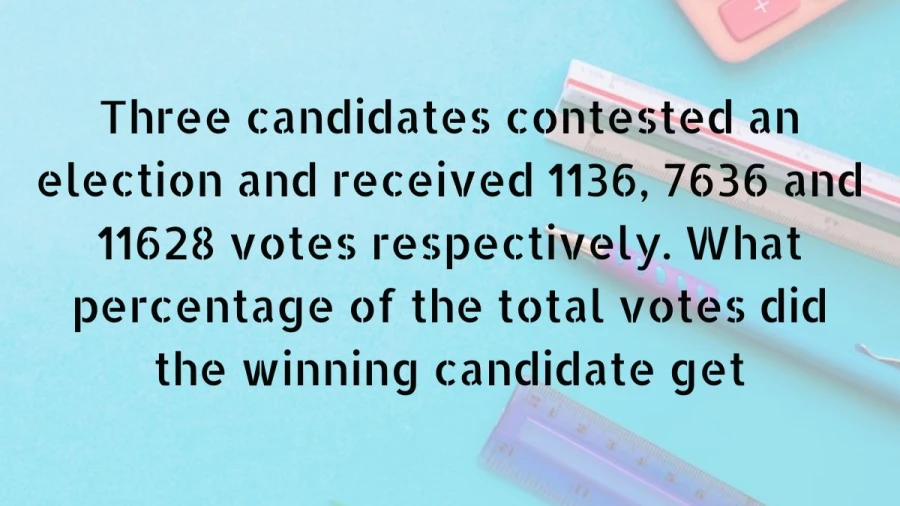If you happen to be viewing the article Three candidates contested an election and received 1136, 7636 and 11628 votes respectively. What percentage of the total votes did the winning candidate get? ? on the website Math Hello Kitty, there are a couple of convenient ways for you to navigate through the content. You have the option to simply scroll down and leisurely read each section at your own pace. Alternatively, if you’re in a rush or looking for specific information, you can swiftly click on the table of contents provided. This will instantly direct you to the exact section that contains the information you need most urgently.
Calculate the winning candidate’s portion of the total votes in a three-candidate election, with vote counts of 1136, 7636, and 11628, to determine the percentage.
Three candidates contested an election and received 1136, 7636 and 11628 votes respectively. What percentage of the total votes did the winning candidate get?
To find out what percentage of the total votes the winning candidate received, you need to calculate the ratio of the winning candidate’s votes to the total votes and then express it as a percentage.
Total votes = 1136 (first candidate) + 7636 (second candidate) + 11628 (winning candidate) = 20400
Now, calculate the percentage of votes received by the winning candidate:
Percentage = (Votes of winning candidate / Total votes) * 100
= (11628 / 20400) * 100 ≈ 57.05%
So, the winning candidate received approximately 57.05% of the total votes.
How to Find the Percentages?
Calculating a Percentage of a Given Number:
- Identify the part (the number you’re interested in) and the whole (the total amount).
- Divide the part by the whole.
- Multiply the result by 100 to express it as a percentage.
Formula:
Percentage = (Part / Whole) * 100%
Example:
What is 25% of 80?
- Part = 25
- Whole = 80
- Percentage = (25 / 80) * 100% = 31.25%
Finding What Percentage One Number Is of Another:
- Divide the smaller number by the larger number.
- Multiply the result by 100 to express it as a percentage.
Formula:
Percentage = (Smaller number / Larger number) * 100%
Example:
What percentage is 12 of 60?
- Smaller number = 12
- Larger number = 60
- Percentage = (12 / 60) * 100% = 20%
Calculating Percentage Increase or Decrease:
- Find the absolute difference between the original and new values.
- Divide the difference by the original value.
- Multiply the result by 100 to express it as a percentage.
Formula:
Percentage change = (Difference / Original value) * 100%
Example:
If a product’s price increases from $100 to $120, what is the percentage increase?
- Difference = $120 – $100 = $20
- Original value = $100
- Percentage change = ($20 / $100) * 100% = 20% increase
Tips:
- For quick calculations, you can convert percentages to decimals by dividing by 100 (e.g., 25% = 0.25).
- For proportions, remember that 100% is equivalent to 1.
- Use a calculator if necessary.
Thank you so much for taking the time to read the article titled Three candidates contested an election and received 1136, 7636 and 11628 votes respectively. What percentage of the total votes did the winning candidate get? written by Math Hello Kitty. Your support means a lot to us! We are glad that you found this article useful. If you have any feedback or thoughts, we would love to hear from you. Don’t forget to leave a comment and review on our website to help introduce it to others. Once again, we sincerely appreciate your support and thank you for being a valued reader!
Source: Math Hello Kitty
Categories: Math

